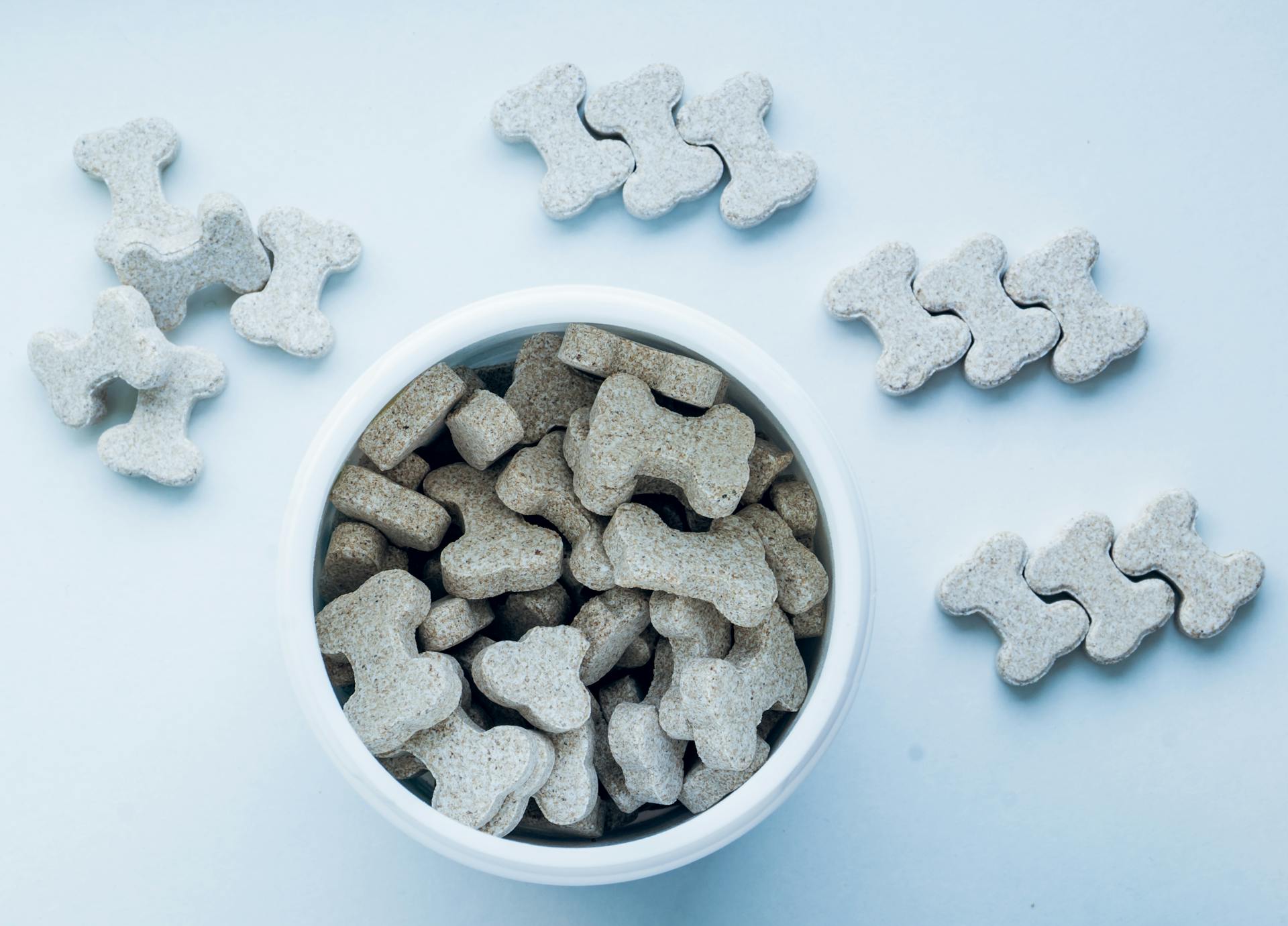
Choosing the right flour for your dog's treats is crucial to ensure their safety and enjoyment. Whole wheat flour is a popular choice due to its high fiber content.
You can also consider using oat flour, which is easily digestible for dogs. Oat flour is a good option for dogs with sensitive stomachs.
Some flours, like almond flour, are not suitable for dogs due to their potential toxicity. Always check the ingredient list carefully before making any treats.
In general, it's best to stick with flours that are specifically labeled as "dog-safe" or "pet-friendly" to avoid any risks.
On a similar theme: Spelt Flour
Choosing Safe Ingredients
Dogs, like humans, can have allergies or sensitivities to certain ingredients, so it's crucial to choose a flour that is free from common allergens such as wheat, gluten, soy, and corn.
Opt for flours that are rich in fibre, vitamins, and minerals to support your dog's overall health. Whole grain flours like whole wheat, oat, and brown rice flour are often more nutritious choices compared to refined flours.
Avoid flours that contain artificial additives, preservatives, or flavourings, as these can be harmful to dogs and may cause digestive issues or allergic reactions. Opt for flours with minimal ingredients and a clean label.
If your dog has specific dietary requirements or health concerns, consult with your veterinarian for personalized recommendations. They can provide guidance on suitable flours based on your dog's individual needs.
Here are some key factors to consider when choosing a dog-safe flour:
- Allergens and Sensitivities: wheat, gluten, soy, and corn are common allergens to avoid
- Nutritional Value: whole grain flours like whole wheat, oat, and brown rice flour are nutritious choices
- Quality and Purity: choose organic or non-GMO flours to minimize the presence of pesticides or genetically modified ingredients
- Additives and Preservatives: avoid flours with artificial additives, preservatives, or flavourings
- Veterinary Recommendations: consult with your veterinarian for personalized recommendations
Understanding Safe Consumption
Dogs can safely eat high-quality grain flours like whole wheat and oats, which are full of nutrients and beneficial for their health.
It's essential to choose flours that are free from toxic substances, allergens, and artificial additives to ensure your dog's overall well-being.
Not all flours are suitable for dogs, as some can cause digestive issues.
Highly processed flours that don't come from whole grains are not great for your pup.
If you want to stay entirely free of grains, there are alternative flours like coconut and almond that aren't made with grains but still have nutritional benefits.
You may need to experiment when substituting non-grain flours into a recipe, but your dog won't mind if the treats don't turn out perfectly.
Additional reading: Which of the following Organs Does a Dog Not Have?
Making Homemade Treats
Making homemade dog treats is a great way to give your furry friend a healthier and more personalized snack option. Not only are homemade treats cheaper than store-bought varieties, but they can also be tailored to your dog's specific dietary needs.
Making your own dog treats allows you to control the ingredients and ensure they're free from additives and preservatives found in commercial treats. This can be especially beneficial for dogs with food allergies or sensitivities.
Homemade dog treats can also be healthier than store-bought varieties, which can contain unhealthy ingredients like fillers and by-products. By using wholesome ingredients, you can create treats that are not only delicious but also nutritious.
Making homemade dog treats is a fun and rewarding experience that can be enjoyed with your dog. You can get creative with different ingredients and recipes to keep your dog engaged and interested in their treats.
Safe Ingredient Options
Safe ingredient options are crucial when it comes to choosing the best flour for dog treats. Consider flours that are free from toxic substances, allergens, and artificial additives.
For dogs with sensitivities, look for flours that are free from common allergens like wheat, gluten, soy, and corn. You can also opt for whole grain flours like oat, brown rice, or whole wheat flour, which are often more nutritious choices.
Some safe ingredient options for dog treats include coconut flour, oat flour, and rye flour. These flours are high in fiber, vitamins, and minerals, and are gentle on your dog's digestive system.
Here are some safe flour options to consider:
Remember to always introduce new ingredients gradually and monitor your dog's response to ensure they tolerate the flour well.
Can Eat Almond?
Almond flour is a nutritious option for dogs, packed with protein, fiber, vitamin E, copper, phosphorous, and other minerals.
Dogs can benefit from the nutrients found in almond flour, but it's essential to note that almonds themselves are not a safe snack for dogs.
Almond flour is made by grinding blanched almonds into a powder, making it a safer option for canine consumption.
In moderation, almond flour can be a healthy addition to your dog's diet, providing a boost of nutrients and fiber.
Can Eat Coconut?
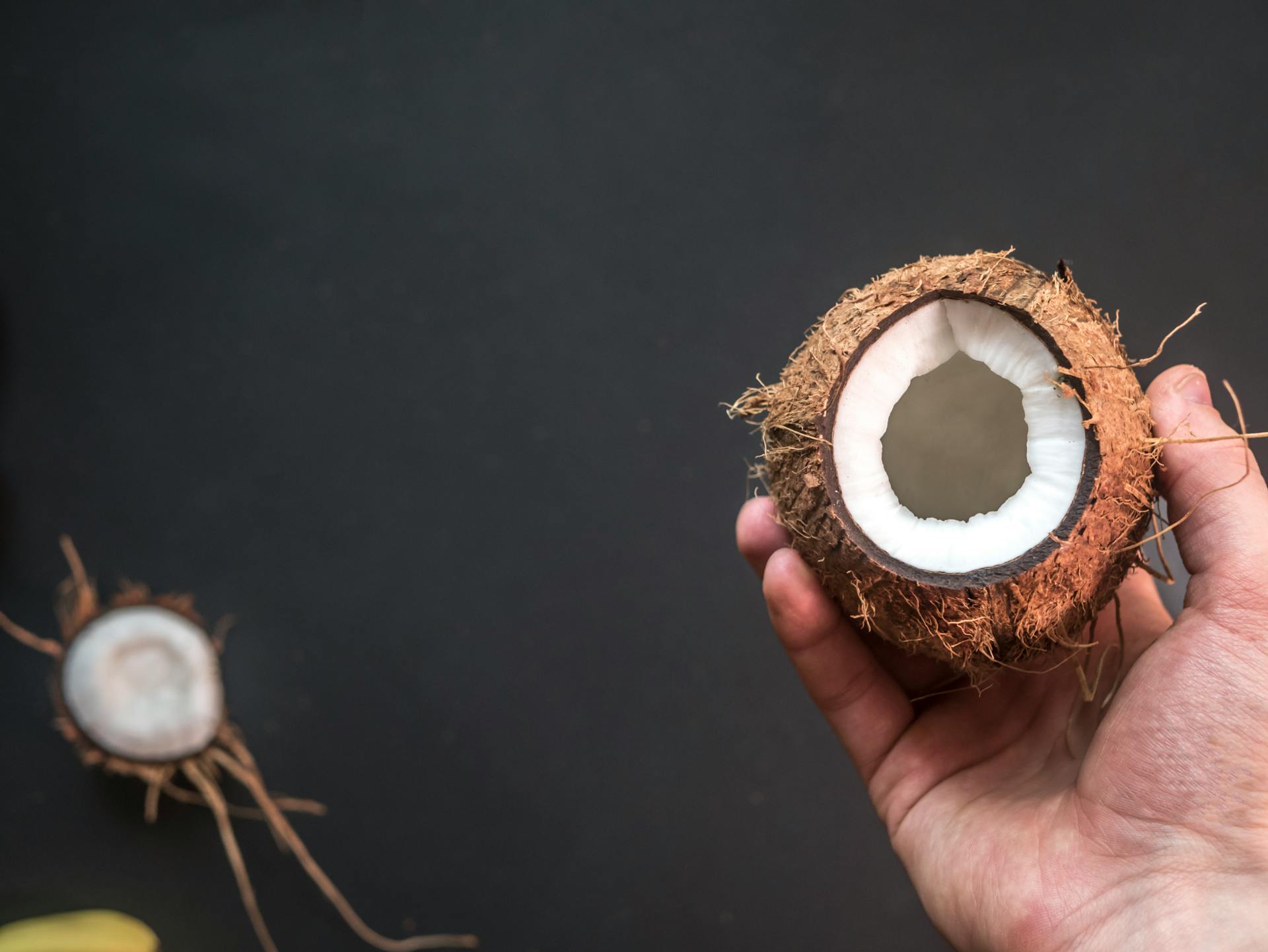
Coconuts are a great option for our furry friends. Coconut flour is a good choice for dogs because it's high in plant proteins and fiber.
Coconut flour is also gluten-free, which is beneficial for dogs with gluten sensitivities. This makes it a suitable alternative to traditional dog foods.
Dogs can benefit from the vitamins and minerals found in coconut flour, including vitamin B6, vitamin C, calcium, and potassium.
All Purpose
All Purpose flour is not the best choice for homemade dog treats, especially if it's highly processed. White flour is highly processed and most people don't recommend giving it to dogs on a regular basis.
If you do choose to use all-purpose flour, it's best to use unbleached flour in moderation. Bleached all-purpose flour is highly processed and some dogs don't tolerate it well.
Your veterinarian can provide guidance on using all-purpose flour for dog treats, especially if you have concerns.
A different take: What Dog Keeps the Best Time?
Whole Wheat
Whole wheat flour is a great option for homemade dog treats, and it's easy to find in stores. It's also relatively affordable and works well in most recipes.
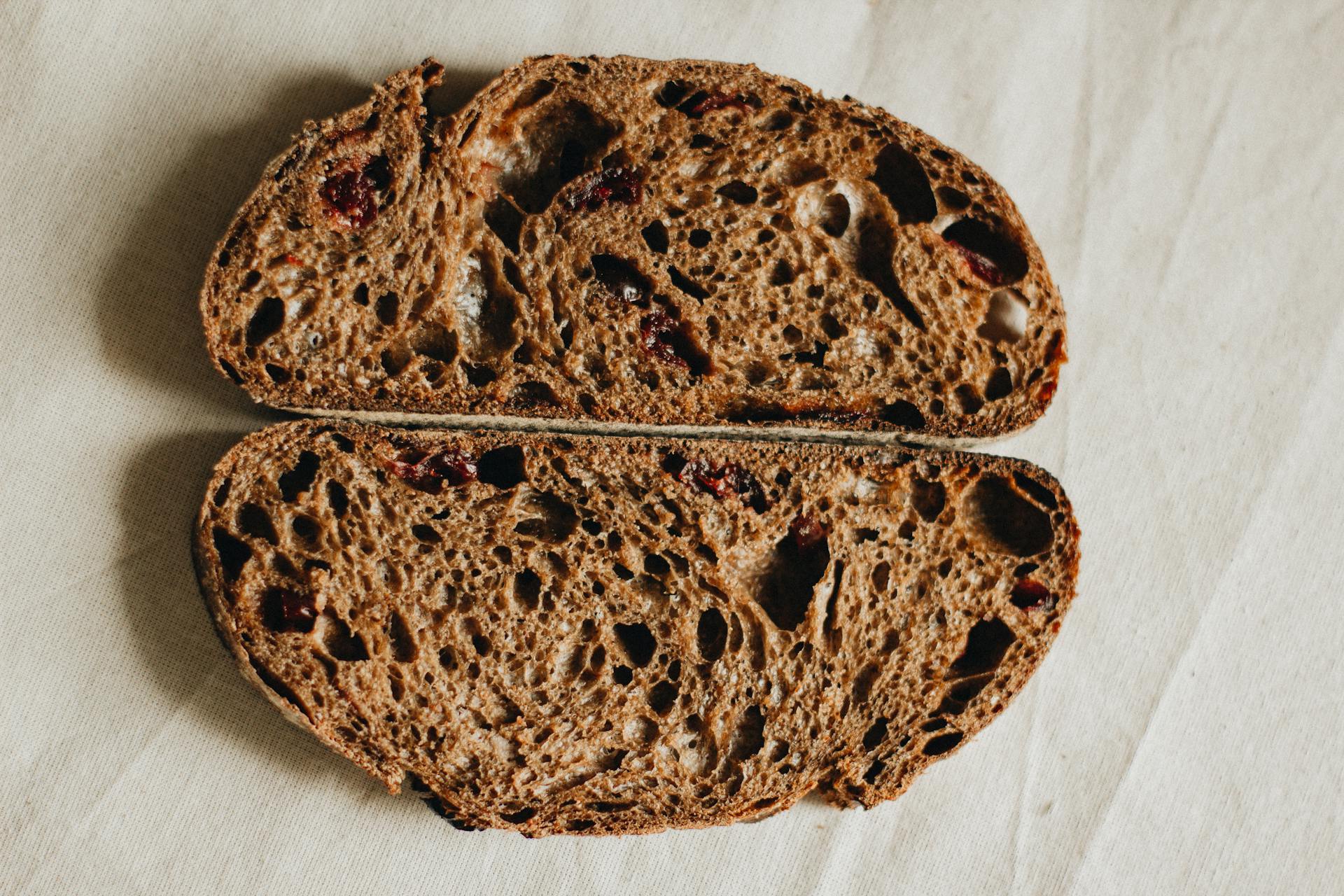
Whole wheat flour is packed with nutritional value for dogs, containing protein, carbohydrates, vitamins, minerals, and fiber. This makes it a great choice for dog owners who want to provide their pets with healthy treats.
The key to choosing the right type of whole wheat flour is to make sure it's true whole wheat flour, which includes the entire wheat kernel. This ensures that your dog gets all the benefits of whole wheat.
Dogs that are allergic to grains can't tolerate whole wheat flour, so it's essential to monitor your dog's reaction to it.
Brown Rice
Brown rice flour is a great choice for dog treat recipes, it's affordable and works well in place of white flour.
It's also a good source of fiber, vitamins, minerals, and antioxidants, making it a nutritious option for your furry friend.
Some dogs may not tolerate brown rice flour because it's a grain, so be sure to introduce it slowly and in small amounts to monitor their reaction.
Brown rice flour is high in iron and potassium, which can be beneficial for dogs with certain health conditions.
Safe Ingredient Options
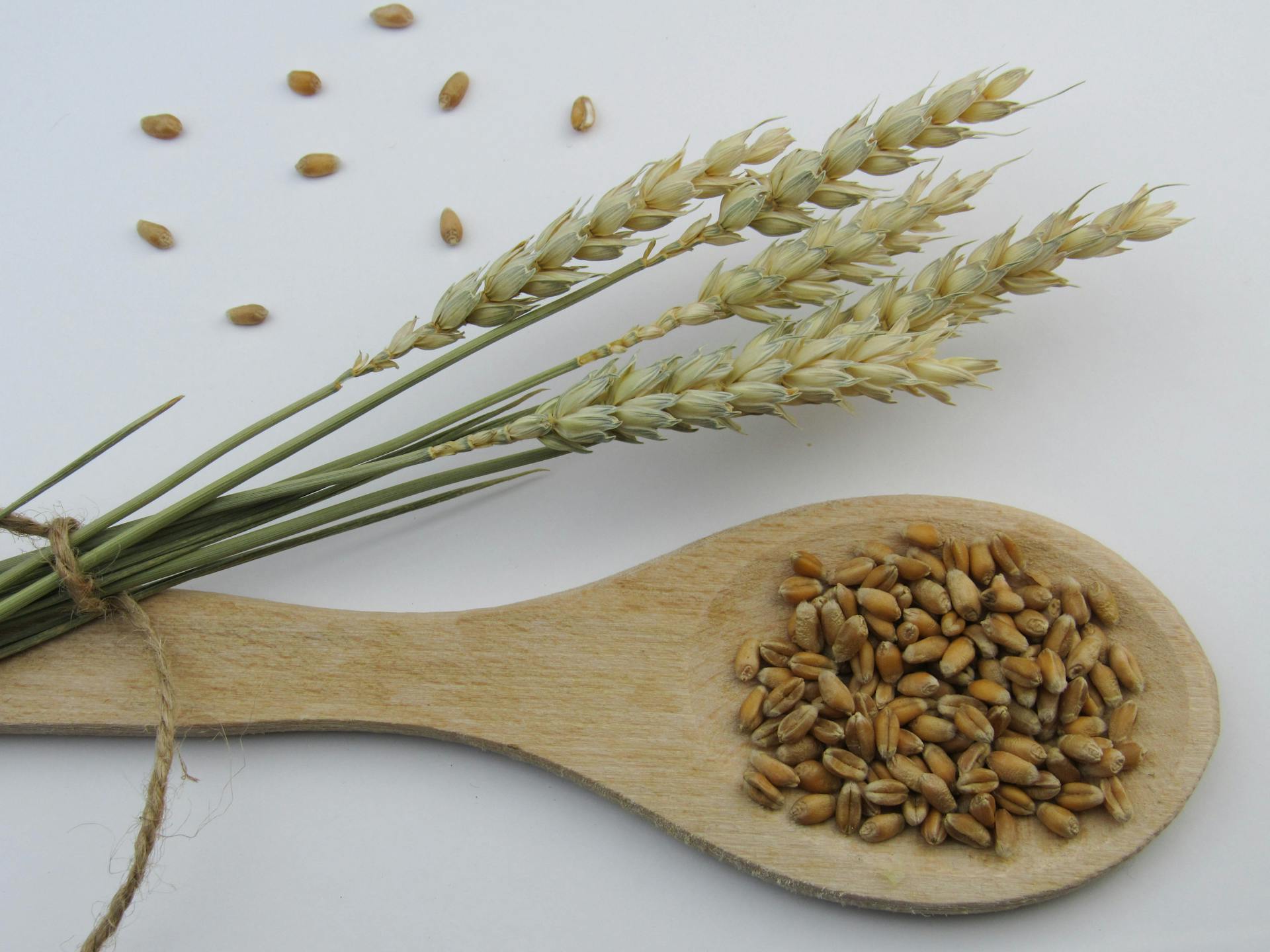
Oat flour is an excellent choice for dog treats, as it's nutritionally dense, gluten-free, and low in sugar. It's full of antioxidants, vitamins, and minerals, making it a great option for your furry friend.
If your dog has sensitivities or allergies, it's crucial to choose a flour that's free from common allergens such as wheat, gluten, soy, and corn. This includes opting for whole grain flours like oat, brown rice, and whole wheat.
Grain-free flours can be a good option for dogs that are allergic to grains, but they can be hard to work with and may be difficult for some dogs to digest. Some examples of grain-free flours include coconut flour, which is high in plant proteins and fiber.
Other types of flours that are safe for dogs include quinoa, arrowroot, tapioca, and potato. However, some flours like quinoa can be difficult for some dogs to digest, so it's essential to introduce them gradually and monitor your dog's response.
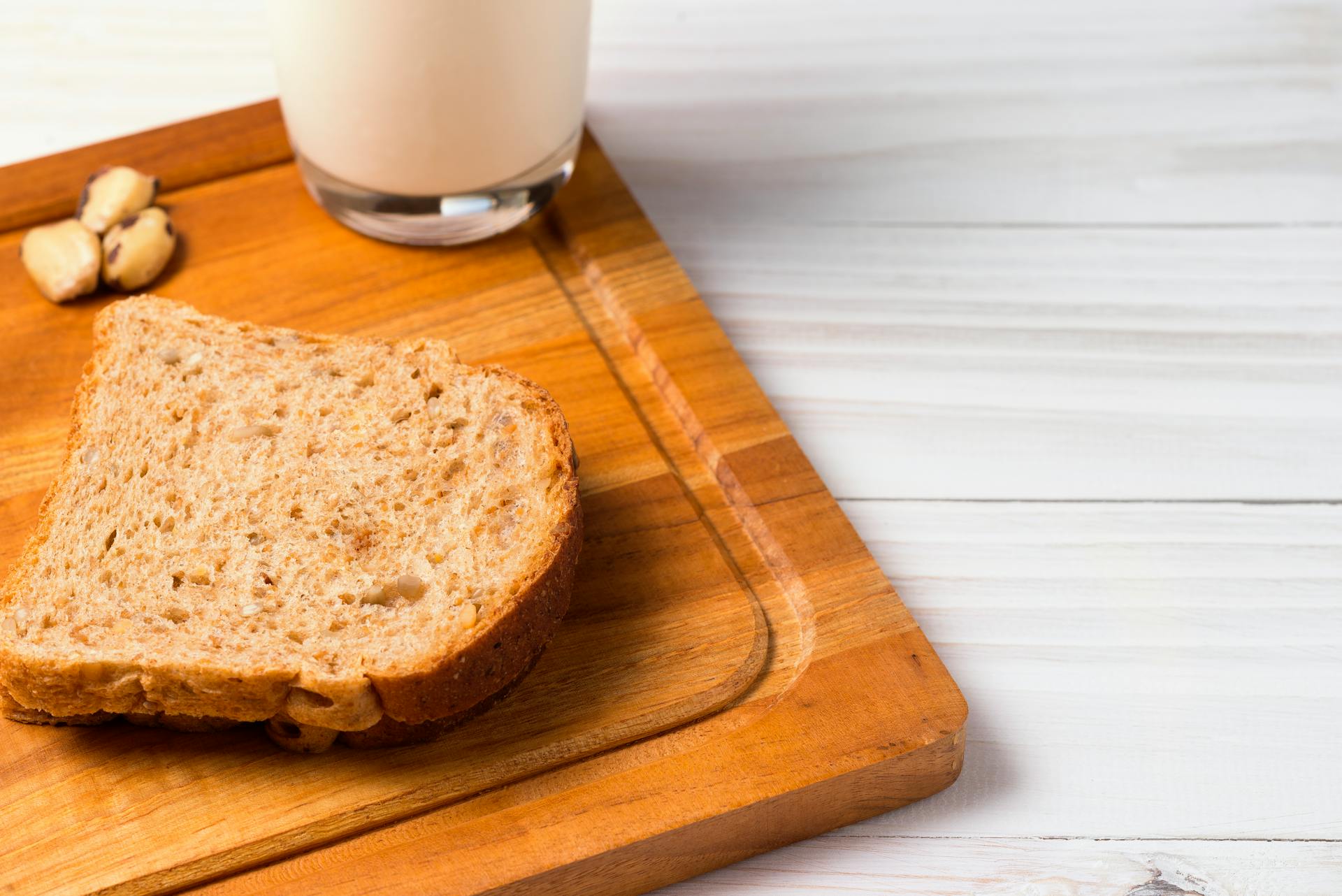
Here are some safe ingredient options for dog treats:
- Oat flour
- Coconut flour
- Quinoa
- Arrowroot
- Tapioca
- Potato
- Chia
- Pea
- Millet
- Buckwheat
Some flours, like gluten-free flours, can soak up more liquid than flours with grain, so it's essential to adjust the recipe accordingly. Always do a trial run when substituting a flour in a dog treat recipe to ensure the best results.
Special Dietary Needs
If your furry friend has a sensitive stomach, look for flours that are easy to digest. Oat flour is a great option, as it's often considered hypoallergenic and can be less likely to cause digestive issues.
For dogs with food allergies, consider using peanut flour, which is a common substitute for traditional wheat flour. Some dogs can tolerate peanut flour just fine, but it's always a good idea to introduce new foods slowly and in small amounts.
Dogs with gluten intolerance or sensitivity can benefit from using rice flour or corn flour as alternatives to traditional wheat flour. These options are naturally gluten-free and can be a good choice for dogs with dietary restrictions.
If your dog has diabetes, it's essential to choose a flour that's low in carbohydrates. Sweet potato flour is a great option, as it's high in fiber and low in carbs, making it a nutritious choice for diabetic dogs.
For more insights, see: Lamb Lung Treats Good
Common Ingredients
When choosing the best flour for your dog treats, it's essential to consider the common ingredients used in recipes. Whole wheat flour is a popular choice for dog treats due to its nutritional value and ease of use.
You can find whole wheat flour in most grocery stores, making it a convenient option. It's also a good source of fiber, which is beneficial for your dog's digestive health.
Oat flour is another common ingredient used in dog treat recipes. It's a good source of fiber and can help support your dog's overall health.
Brown rice flour is a popular choice for dogs with sensitive stomachs. It's easy to digest and can help soothe any stomach issues.
Coconut flour is a good option for dogs with food allergies. It's gluten-free and can be a good substitute for other flours.
Almond flour is a popular choice for dogs with sensitive skin. It's a good source of protein and can help support your dog's overall health.
Here are the 5 most common flours used in dog treat recipes:
- Whole wheat flour
- Oat flour
- Brown rice flour
- Coconut flour
- Almond flour
Frequently Asked Questions
What is the easiest flour for dogs to digest?
For dogs with sensitive stomachs, oat flour is a gentle and easily digestible option due to its low sugar content and gluten-free properties. It's a nutritious and easily absorbed carbohydrate source that can be a great alternative to other flours.
Is coconut flour or wheat flour better for dogs?
For dogs, coconut flour is a better choice than wheat flour due to its low glycemic index and high fiber content, which can aid in digestion. Consider using coconut flour as a nutritious alternative in your dog's diet.
Sources
- https://eileenanddogs.com/blog/2014/08/29/non-crumbly-brownies-dogs/
- https://coopersdogtreats.com/blogs/news/can-dogs-eat-flour-and-what-kinds-are-best
- https://www.wiggleworthy.com/flour-for-dog-treat-recipes.html
- https://drooliciousdogtreats.com/the-5-best-flours-for-making-dog-treat-recipes/
- https://allfortheloveofdogs.ca/2023/06/25/dog-safe-flours-a-comprehensive-guide-to-choosing-the-best-options/
Featured Images: pexels.com


